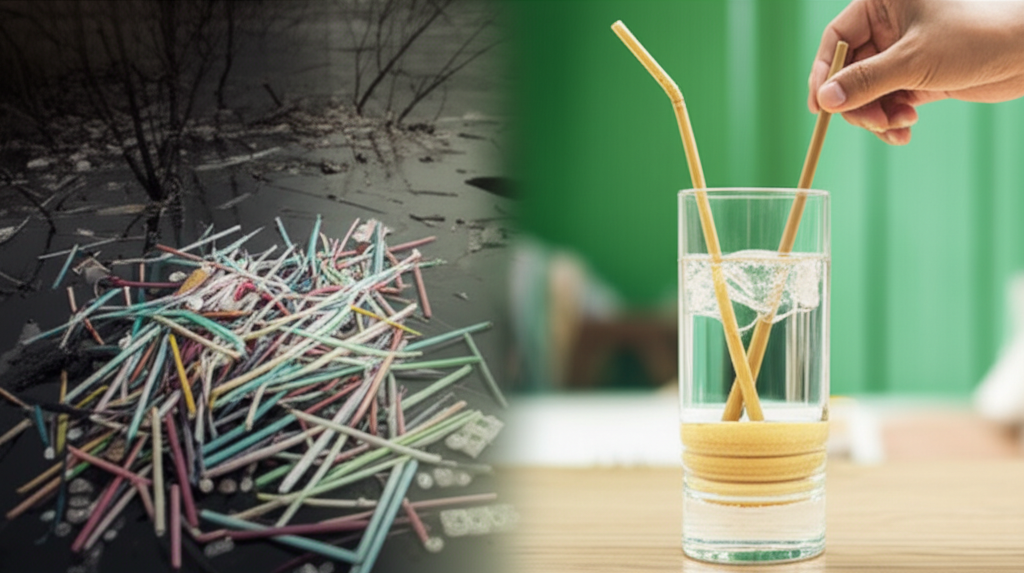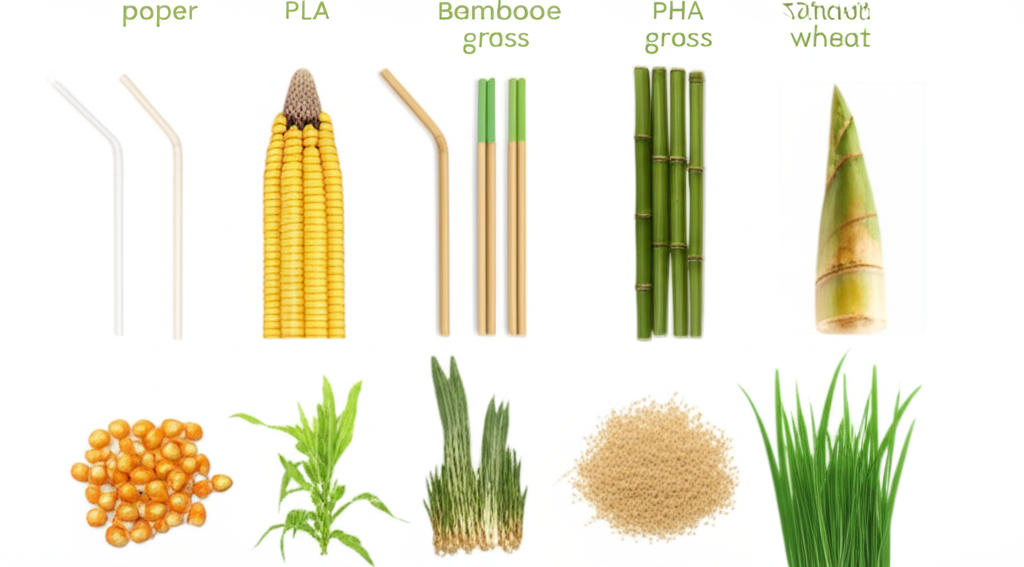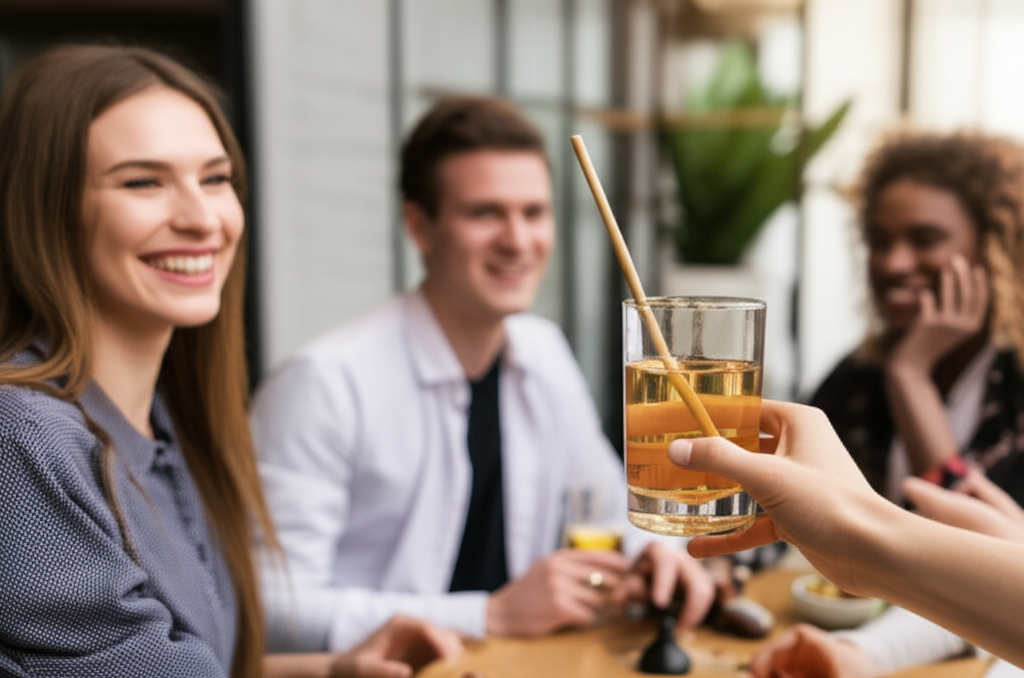世界の商業と文化の基礎であるホスピタリティ産業は、環境負荷という無視できない計算に直面しています。使い捨てプラスチック、特にストローはこの課題の目に見える象徴となっており、ブランドの認識や事業の持続可能性に影を落としています。毎年、何十億ものプラスチックストローが埋め立て地に溢れ出て海洋を汚染し、海洋生物に影響を与え、分解されて残留性のマイクロプラスチックになっています。この激化する世界的危機は、単なる環境問題ではありません。これは世界中のホテル、レストラン、カフェ、イベント会場にとって直接的なビジネス上の必須事項です。
消費者が環境問題に対する意識を高め、発言するようになるにつれて、購入の意思決定は劇的に変化しています。持続可能なビジネス慣行は、もはやニッチな好みではなく、主流の期待となっています。現代のゲストにとって、環境に優しいストローは単なる細かいものではありません。これは、地球の健康に対する企業の取り組みを示す、非常に目立つ宣言です。この意識的な消費に対する需要の高まりは、世界的および地域的な規制からの圧力の激化と結びついています。欧州連合の使い捨てプラスチック指令は、米国全土の数多くの州レベルの禁止と並んで、従来のプラスチック製ストローからの決定的な移行を義務付けており、持続可能な代替品への移行は倫理的な選択であるだけでなく、業界の意思決定者にとって重要なコンプライアンス要件となっています。

ストローの歴史は想像よりはるかに古く、多様性に富んでいます。ゴールデンからは電球16 世紀のアルゼンチンでマテ茶を飲むために使用されていたストローから、1800 年代のライ麦ストローまで、人類は長い間飲み物を楽しむ賢い方法を模索してきました。 1888 年にマービン C. ストーンが現代の紙ストローを発明したことは、天然草に代わるよりクリーンでよりおいしい代替品を提供するという重要な転換点となりました。何十年もの間、紙のストローが一般的でしたが、20世紀半ばになると安価な大量生産プラスチックが普及し、自然の代替品は影を潜めました。しかし、この便利な時代は莫大な環境コストをもたらし、今日私たちが直面している持続可能な解決策に対する緊急の需要に直接つながりました。
バイオストローとは一体何なのでしょうか?
この環境への目覚めは、新世代のイノベーションをもたらしました。バイオストロー。しかし、それらは一体何なのでしょうか?本質的に、バイオストローは自然に分解するように特別に設計された環境に優しい代替品であり、埋め立て地や海洋廃棄物を大幅に削減します。何世紀にもわたって持続する従来のプラスチックとは異なり、バイオストローはコーンスターチ、サトウキビ(バガス)、竹、草、小麦などの再生可能な植物ベースの材料から作られています。この組成により、湿気、熱、微生物の活動などの自然環境条件にさらされると、より単純な有機化合物に分解されます。市場はこの重要な変化を反映しています。世界の環境に優しいストロー市場は単に成長しているだけでなく、急増し、2035 年までに 251 億米ドル近くに達すると予測されています。この爆発的な成長は、厳格な規制変更と、真に持続可能な食事とホスピタリティ体験に対する消費者の嗜好の進化の両方を明確に示しています。

ホスピタリティ業界の調達マネージャーやオペレーションディレクターにとって、バイオストロー素材の多様な状況を乗り切るには、戦略的なアプローチが必要です。単にプラスチックを置き換えるだけではありません。それはパフォーマンスを最適化し、真の持続可能性を確保し、ゲストエクスペリエンスを向上させることです。選択プロセスでは、耐久性、ユーザー満足度、生分解性、ますます複雑化する規制への準拠などの要素を考慮する必要があります。
バイオストローの種類を詳しく調べる: B2B 意思決定ガイド
バイオストローの種類を詳しく調べて、B2B の主要な意思決定基準に照らして評価してみましょう。
- 紙ストロー: 従来の紙ストローは生分解性で広く入手可能ですが、湿ってユーザーエクスペリエンスに影響を与えることで悪名が高いです。さらに、環境保全性と消費者の健康の両方を損なう可能性のあるプラスチックコーティング、有毒インク、および多くのブランドでの PFAS (「永遠の化学物質」) の驚くべき発見に関する懸念が浮上しています。
- PLAストロー(ポリ乳酸): コーンスターチやサトウキビなどの再生可能資源から作られた PLA ストローは、従来のプラスチックの感触と機能をよく再現しています。これらはユーザーエクスペリエンスの点で優れた架け橋となりますが、主な制限は、産業用堆肥化施設が効果的に分解する必要があることです。つまり、一般的な埋め立て地や自然環境では劣化しないということです。
- PHA ストロー (ポリヒドロキシアルカノエート): 微生物発酵によって有機材料から得られる PHA ストローは、大きな進歩を示しています。丈夫で、温かい飲み物でも冷たい飲み物でも完全性を維持し、環境に負担をかけずにプラスチックのような感触を提供します。重要なことは、多くの PHA ストローは海洋生分解性であることが認定されており、工業用堆肥、家庭用堆肥、さらには海水などのさまざまな環境で数か月以内に完全に分解することができます。また、その生産は従来のプラスチックと比較して二酸化炭素排出量が大幅に削減されています。先進的な材料ソリューションをより深く理解するには、次の点に関する当社の洞察をご覧ください。 持続可能なパッケージングの革新。
- サトウキビストロー: サトウキビ加工の繊維状副産物であるバガスから作られたこれらのストローは、自然に生分解性があり、丈夫で、多くの場合家庭で堆肥化可能です。これらは、農業廃棄物を再利用する、堅牢で非毒性、グルテンフリーのオプションです。
- 草/小麦/竹ストロー: これらの自然なオプションは、独特の美しさと質感を提供します。草や小麦のストローは堆肥化可能で形状がよく保たれますが、竹のストローは自然な耐久性があり、多くの場合再利用できるため、より高級で素朴な感触が得られます。

「グリーンウォッシング」を回避し、持続可能性への取り組みが本物であることを確認し、ブランドと顧客の両方を保護するには、認定された PFAS フリーのオプションを選択することが最も重要です。プラスチックから真に環境に優しい代替品への移行は、顧客にとって非常に目立つシグナルとなり、混雑した市場において貴施設の差別化を図ることができます。スターバックス(ヨーロッパで PHA ストローを試験的に導入している)やダンキンのようなコーヒー大手から、スイートグリーンのようなファストカジュアルのイノベーターまで、ホスピタリティ業界の大手企業は、先進的なバイオ ストローの導入に成功しています。この傾向は、より広範な業界の方向転換を強調しており、持続可能性が消費者の価値観と一致するだけでなく、ビジネスに具体的なメリットももたらすことを示しています。当社のソリューションは、お客様のビジネスがこれらの進化する需要に対応できるようにし、コンプライアンスからゲストの満足度まで、業務のあらゆる側面を強化します。情報に基づいてビジネス上の意思決定を行う方法について詳しくは、次のガイドをご覧ください。環境に優しい製品を選ぶ。環境意識の高い消費者が、目に見えて環境責任を優先する企業を支持する傾向が強まっており、持続可能性に対するこの積極的なアプローチは、ブランドイメージの向上と顧客ロイヤルティの強化に直接つながります。実際、そのような取り組みを採用した後、多くの人が肯定的なフィードバック、満足度の向上、後援の増加を報告しています。米国と欧州のホスピタリティ業界では、規制上の圧力と持続可能な食事と宿泊体験を積極的に求める消費者層の増加により、これらのソリューションが急速に受け入れられています。この傾向はストローを超えて、より広範な持続可能な実践を包含しており、環境に配慮した運営が将来の成功の鍵であるという考えを強化しています。業界のトレンドに関するさらなる洞察については、次のサイトを参照してください。将来の市場洞察。
ホスピタリティ業界にとっての戦略的責務は明らかです。先進的なバイオストローソリューションの採用はもはやオプションではありませんが、長期的なブランドの評判、規制遵守、市場の持続的な成長には不可欠です。材料科学と設計における継続的な革新により、企業は将来のソリューションの耐久性、生分解性、費用対効果が向上し、移行がますますシームレスで有益なものになることが保証されます。
ホスピタリティの意思決定者は、問題が多い従来の使い捨てオプションを超えて、自社の運営に真に持続可能なストロー ソリューションを積極的に評価する時期が来ています。貴施設の持続可能性を高め、ゲストエクスペリエンスを向上させ、急速に進化する市場においてビジネスの将来性を確保します。
目に見える影響を与える準備はできていますか?
最先端の海洋生分解性 PHA オプションを含む、PFAS フリーの高性能バイオ ストローの包括的な製品ラインナップを検討するには、今すぐお問い合わせください。お客様固有の運用ニーズに合わせて持続可能な最適な選択を行うお手伝いをいたします。カスタマイズされたコンサルティングをスケジュールする
momoio.com が持続可能な飲酒戦略をどのように変革できるかをご覧ください。
持続可能なホスピタリティの詳細については、次のサイトをご覧ください。持続可能な飲み物またはに関する記事を検索してくださいグリーンホスピタリティ実践。より広範な環境ソリューションも次のサイトで見つけることができます。グリーンプリント製品。






